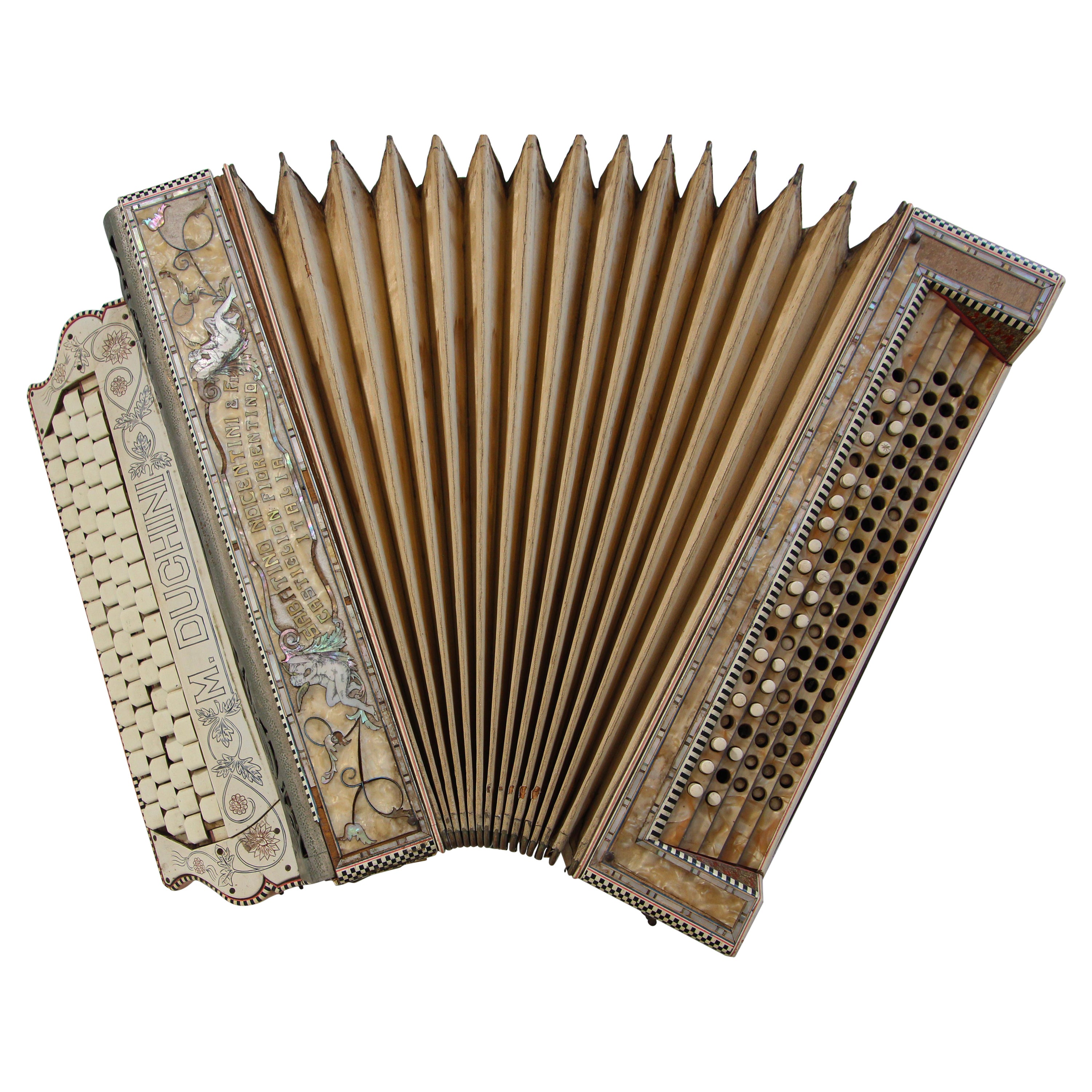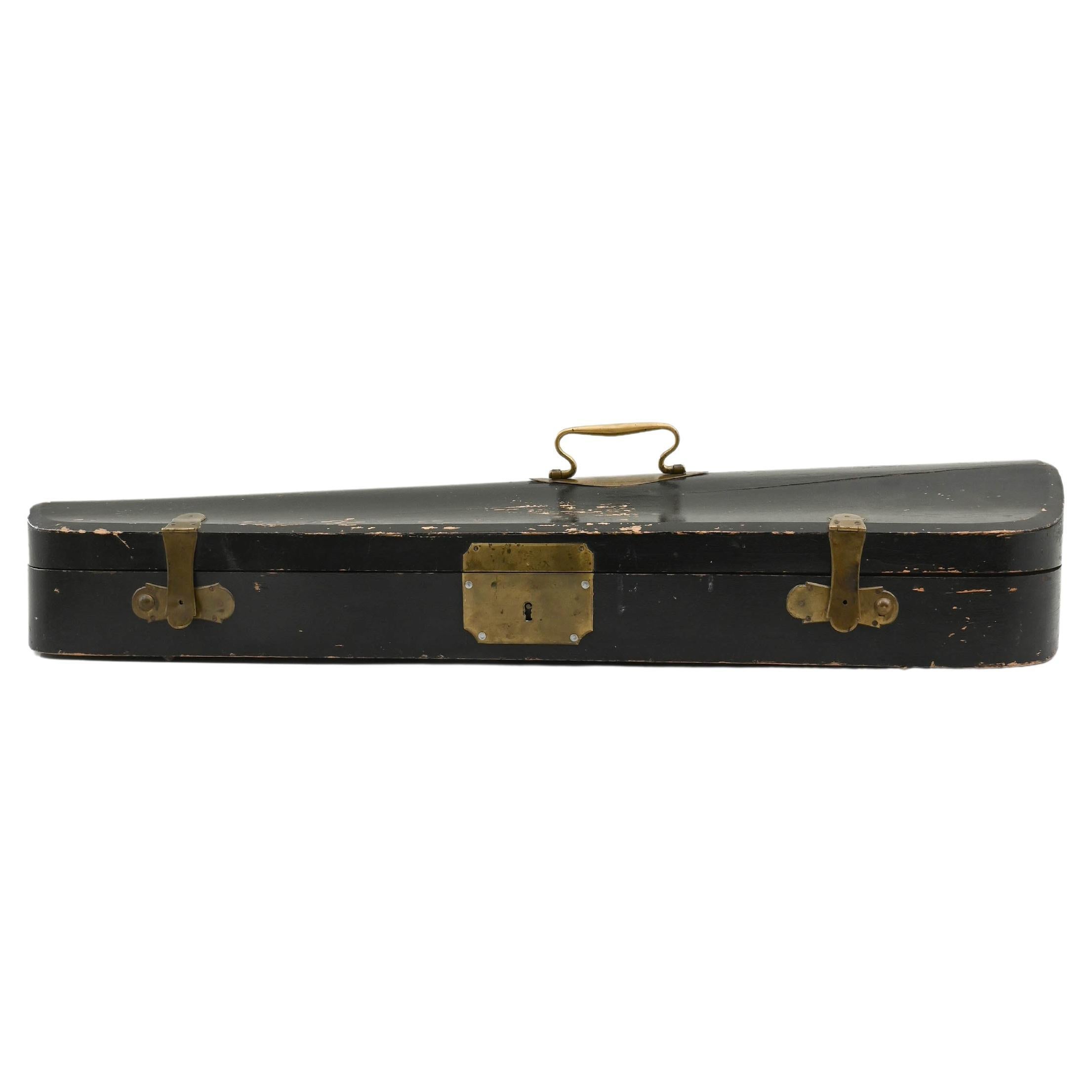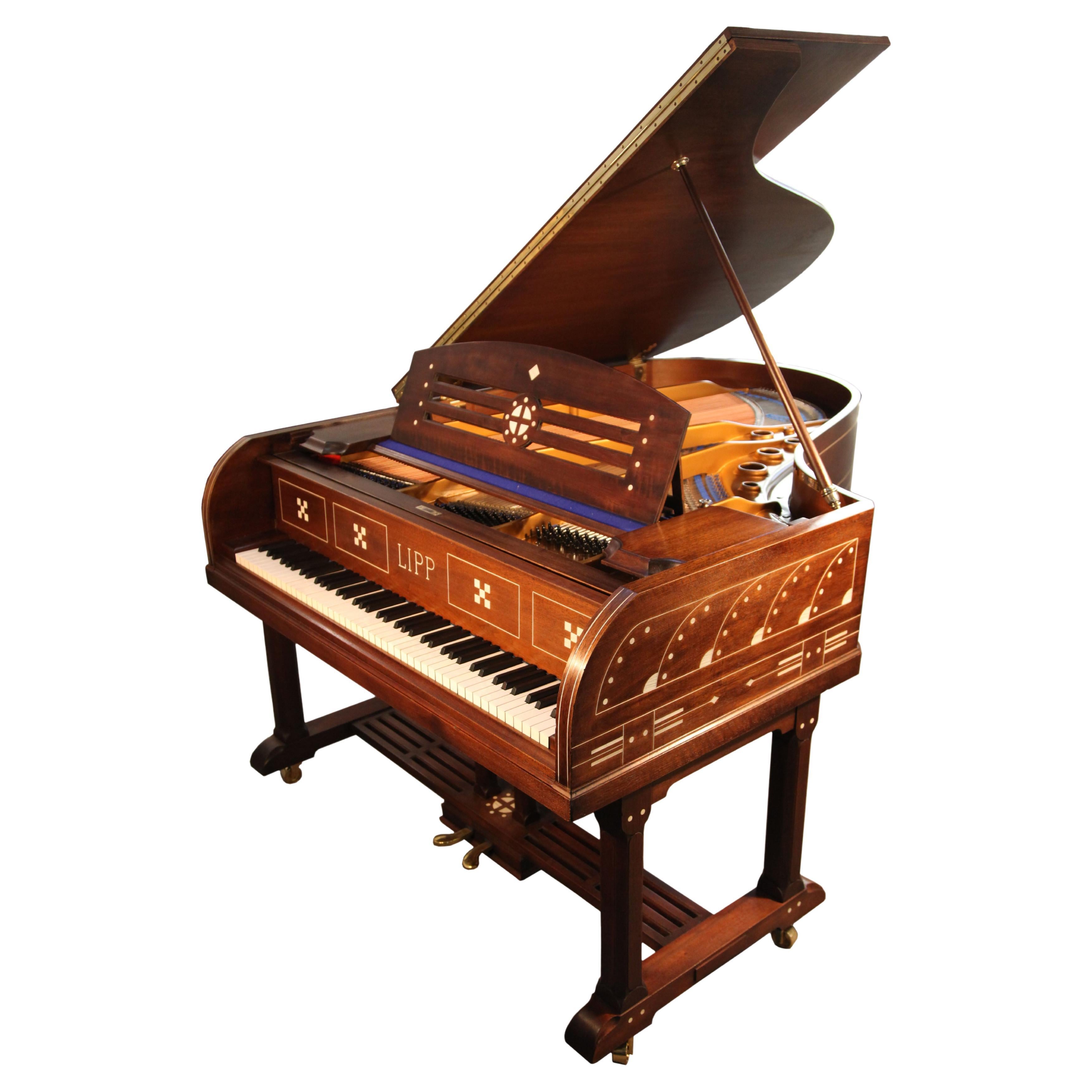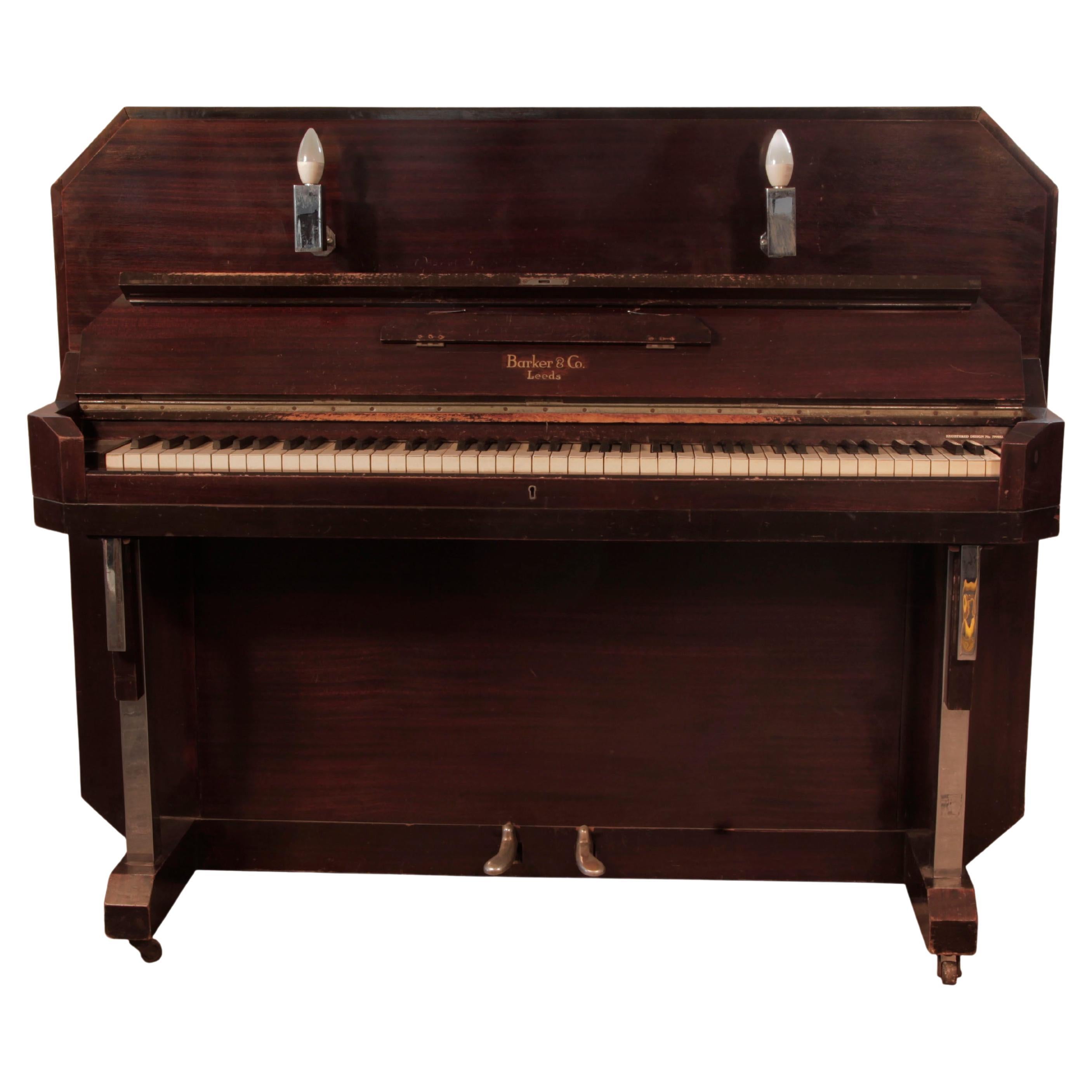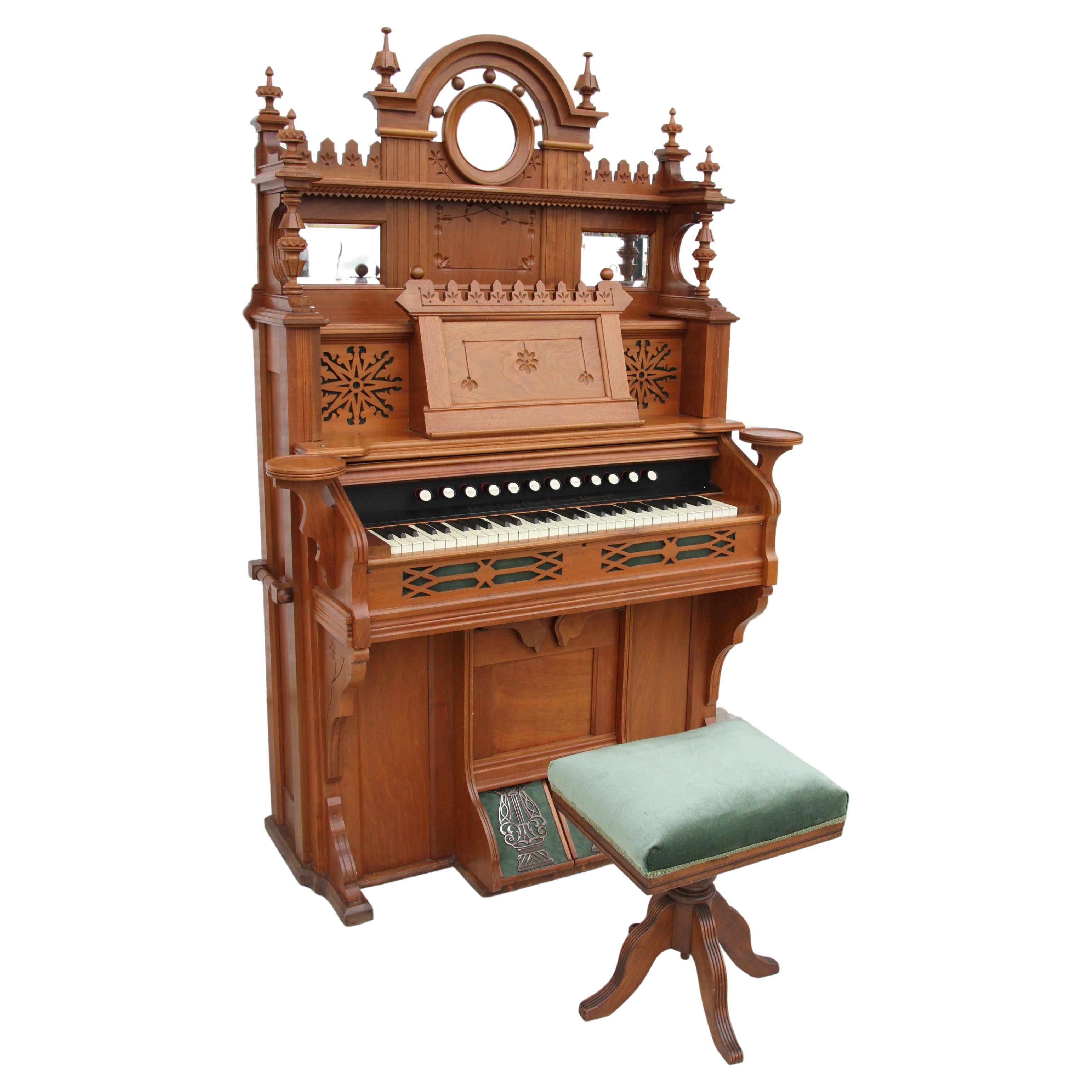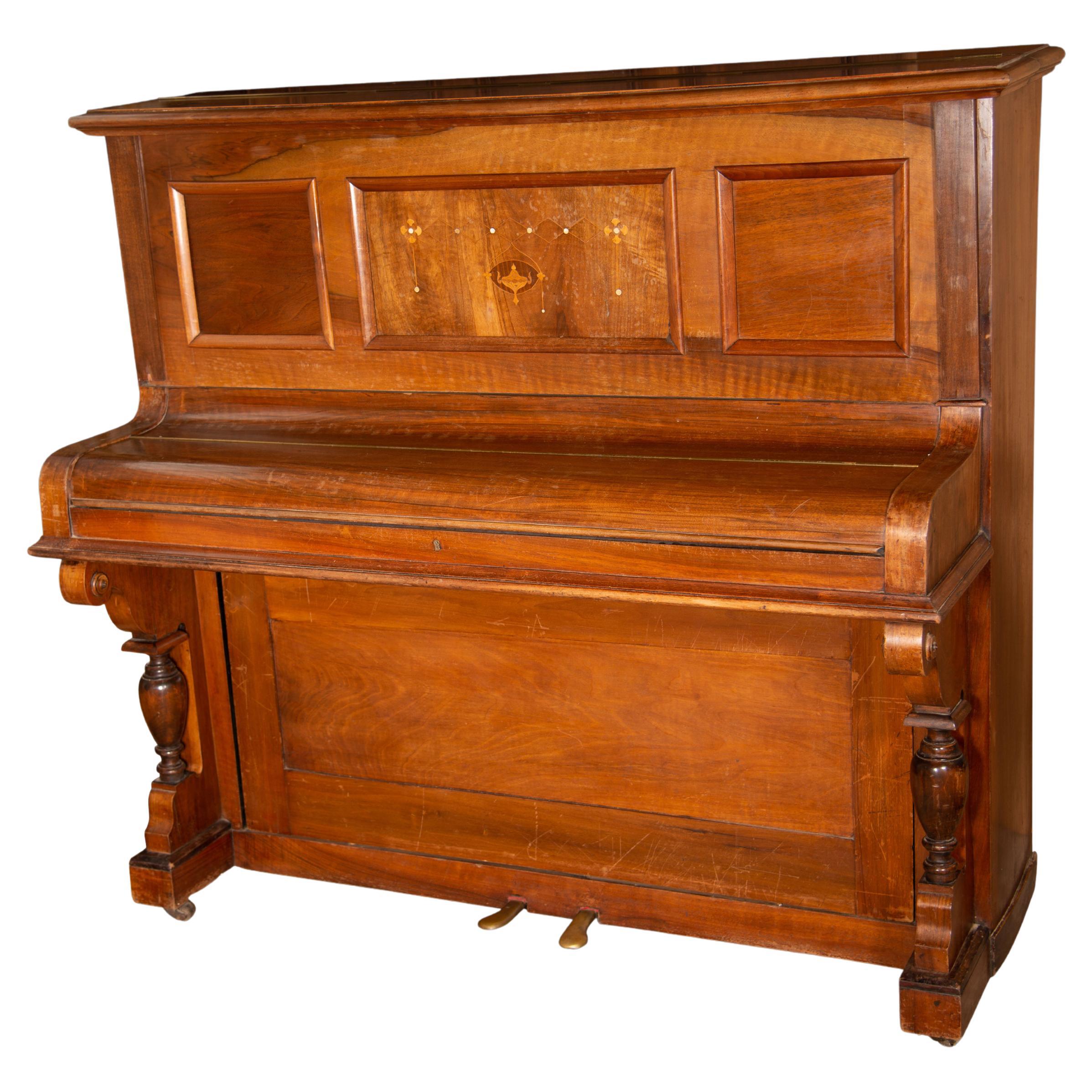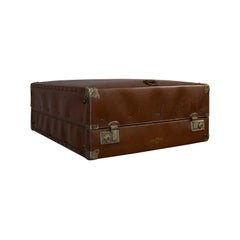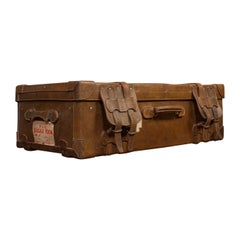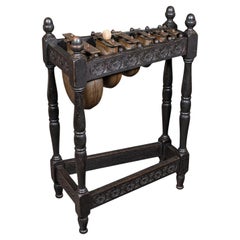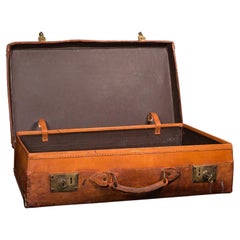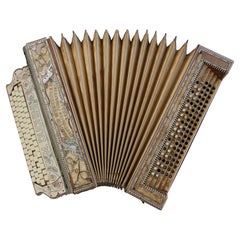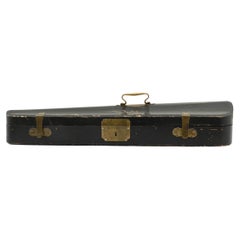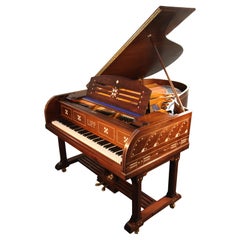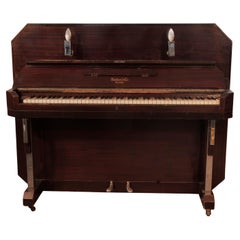Items Similar to Vintage Piano Accordion, German, Squeezebox, Meinel and Herold, Dix Reeds
Want more images or videos?
Request additional images or videos from the seller
1 of 13
Vintage Piano Accordion, German, Squeezebox, Meinel and Herold, Dix Reeds
$1,458.17
£1,040
€1,235.69
CA$1,989.98
A$2,216.02
CHF 1,153.32
MX$27,323.27
NOK 14,688.37
SEK 13,805.64
DKK 9,219.76
Shipping
Retrieving quote...The 1stDibs Promise:
Authenticity Guarantee,
Money-Back Guarantee,
24-Hour Cancellation
About the Item
This is a vintage piano accordion. A German, pearloid squeezebox by Meinel and Herold with Dix reeds and carry case, dating to the mid-20th century, circa 1940.
Of profuse decoration and with original carry case
Accordion displays a desirable aged patina
Robust, shaped case in good order, commensurate with age
Leather straps show some wear, but of good, serviceable condition
Pearloid fascia offering copious visual appeal
Further decorated with inlaid foliate detail to the bellows and bass box
Treble keys decorated in pearloid ivory with glittering sharp keys
Faux mother of pearl ivory also features as the treble grille, with a golden glitter border beneath
Crafted by Meinel and Herold of Klingenthal in Saxony
Bellows in perfect order- free from tears and of beautiful tone
Super Dix VL reeds by the renowned Dix Langsschliff-Tonzungen D.R.P. with maker's mark
120 button-type bass keys with shaped grille openings
This is a fantastic vintage piano accordion, from a sought after company and with high quality reeds and decoration. Delivered polished and ready for the home.
Dimensions:
Max width 39cm (15.25")
Max depth 26cm (10.25")
Max height 54cm (21.25")
Bellows extended width 73cm (28.75")
Case (Laid Flat):
Width 58.5cm (23")
Depth 51cm (20")
Height 24.5cm (9.75")
We offer a 100% satisfaction guarantee with all of our antiques.
- Dimensions:Height: 21.26 in (54 cm)Width: 15.36 in (39 cm)Depth: 10.24 in (26 cm)
- Materials and Techniques:
- Place of Origin:
- Period:
- Date of Manufacture:circa 1940
- Condition:Wear consistent with age and use. Presented in very good vintage condition.
- Seller Location:Hele, Devon, GB
- Reference Number:Seller: 18.61901stDibs: LU2645317033332
About the Seller
5.0
Platinum Seller
Premium sellers with a 4.7+ rating and 24-hour response times
Established in 2005
1stDibs seller since 2017
1,013 sales on 1stDibs
Typical response time: 1 hour
- ShippingRetrieving quote...Shipping from: Hele, Devon, United Kingdom
- Return Policy
Authenticity Guarantee
In the unlikely event there’s an issue with an item’s authenticity, contact us within 1 year for a full refund. DetailsMoney-Back Guarantee
If your item is not as described, is damaged in transit, or does not arrive, contact us within 7 days for a full refund. Details24-Hour Cancellation
You have a 24-hour grace period in which to reconsider your purchase, with no questions asked.Vetted Professional Sellers
Our world-class sellers must adhere to strict standards for service and quality, maintaining the integrity of our listings.Price-Match Guarantee
If you find that a seller listed the same item for a lower price elsewhere, we’ll match it.Trusted Global Delivery
Our best-in-class carrier network provides specialized shipping options worldwide, including custom delivery.More From This Seller
View AllVintage Shoe Travelling Case, Salesman's, Collector's, Travel Trunk, Globite
Located in Hele, Devon, GB
This is a vintage shoe travelling case. An Australian, salesman’s or collectors travel trunk by Globite, dating to the early 20th century, circa 1930.
...
Category
Early 20th Century Australian Trunks and Luggage
Materials
Leather
Very Large Antique Travel Suitcase, English, Leather, Steamer, Shipping Trunk
Located in Hele, Devon, GB
This is a very large travel suitcase. An English, leather steamer or shipping trunk, dating to the late Victorian period, circa 1900.
Generously sized for the grandest of tours
Displays a desirable aged patina
Rich, sturdy leather in delightful caramel hues
Braced with oak stiles and leather shoulders
Large leather straps with a quartet of buckles
Decorated with period travel labels for visual interest
Marked with the name Calmady-Hamlyn - a high-ranking British officer and Justice of Peace
Dark maroon fabric lining to the interior
Full-width removable stowage tray
Lid interior complete with a ruched fabric pocket
This is a fascinatingly large antique suitcase...
Category
Antique Late 19th Century English Victorian Trunks and Luggage
Materials
Leather
Antique Marimbaphone, English Brass, Oak, Musical Instrument, Glockenspiel, 1920
Located in Hele, Devon, GB
This is an antique marimbaphone. An English, brass and oak decorative musical instrument, dating to the early 20th century, circa 1920.
A striking, concussive idiophone with beautif...
Category
Vintage 1920s British Arts and Crafts Musical Instruments
Materials
Brass
Large Antique Suitcase, English, Leather, Gentleman's Travelling Case, Edwardian
Located in Hele, Devon, GB
This is a large antique suitcase. An English, leather and brass gentleman's travelling case by Tom Hill - Sloane Street, dating to the Edwardian...
Category
Early 20th Century British Trunks and Luggage
Materials
Leather
Antique Craftsman's Trunk, English, Carpentry, Maritime, Tool Chest, Victorian
Located in Hele, Devon, GB
This is an antique craftsman's trunk. An English, pine carpentry or maritime tool chest, dating to the early Victorian period, circa 1850.
Generou...
Category
Antique Mid-19th Century British Trunks and Luggage
Materials
Pine
Antique Box Field Camera and Tripod, English, Accessories, Ornamental, Victorian
Located in Hele, Devon, GB
This is an antique Field Camera and tripod. An English, mahogany and brass plate camera with accessories and lens, dating to the late Victorian p...
Category
Antique Late 19th Century British Late Victorian Scientific Instruments
Materials
Brass
You May Also Like
Accordion by Sabatino Nocentini & Figli Made in Florence, Italy
Located in North Hollywood, CA
Antique Italian custom made accordion by Sabatino Nocentini Castiglion & Figli.
Antique pearl white accordion, Italian accordion with profuse inlay decoration, gorgeous hand made wit...
Category
Early 20th Century Italian Art Deco Musical Instruments
Materials
Abalone, Wood, Shell
20th Century European Wooden Instrument Case
Located in High Point, NC
Made in Europe in the 20th Century, this vintage wooden case would have originally been used to hold a musical instrument—the distinctive shape sug...
Category
20th Century European Musical Instruments
Materials
Wood
Arts and Crafts Style Lipp Grand Piano Inlaid Germanic Folklore Motifs
Located in Leeds, GB
Arts and Crafts style, Lipp grand piano for sale with a mahogany case inlaid with symbols and designs from Germanic folklore. Case features ornate brass hinges and slatted cross stretcher. The mahogany cabinet is polished in matt to emphasize the quality of the wood used. Cabinet features a simple geometric cross stretcher supporting the simple gate legs. The Arts and Crafts period championed the simplicity of form and the construction of the object. Here, the brass hinges are accentuated with two-tone brass and stamped geometric designs. Richard Lipp...
Category
Early 20th Century German Arts and Crafts Musical Instruments
Materials
Mahogany
Art Deco Barker Upright Piano Chrome Mahogany Geometric Case Styling
Located in Leeds, GB
A 1930's Barker upright piano with an Art Deco style mahogany case. Cabinet features strong angular styling, evident in the chamfered corners at the top and b...
Category
Early 20th Century English Art Deco Musical Instruments
Materials
Chrome
Antique Pump Organ NO50 Chicago Cottage Organ Company
Located in Pasadena, TX
19th Century Eastlake Style Walnut Pump Organ by Chicago Organ Company
Gorgeous elaborately carved antique pump organ made by the Chicago
Organ Co.
Black...
Category
Early 20th Century American Eastlake Musical Instruments
Materials
Walnut
Upright piano. Towards the beginning of the 20th century.
Located in Madrid, ES
Upright piano. Towards the beginning of the 20th century.
Upright or wall piano with a wooden body with marquetry elements on the central panel of the uppe...
Category
20th Century European Other Musical Instruments
Materials
Other
More Ways To Browse
Used Accordions
Golden Pearl Vintage
Accordion Musical Instrument
Piano Accordion
Brionvega Rr 126
Cathedral Radio
Chinoiserie Piano
Erard Grand Piano
Horn Speakers
Phonograph Horn
Radio Phonograph
Rr 126
Vintage Acoustic Guitars Acoustic Guitars
Vintage Catalin Radios
Vintage Juke
Accordion Musical Instrument
Antique Music Box With Discs
Antique Player Piano
